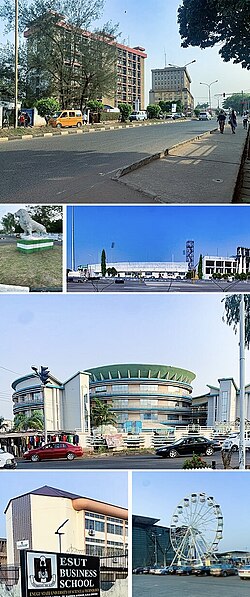
Back إنوغو Arabic انوجو ARZ انوقو AZB Енугу Bulgarian Enugu (ciutat) Catalan Enugu Czech Enugu Danish Enugu (Nigeria) German Enugu (urbo) Esperanto Enugu Spanish
Enugu
Enugu | |
|---|---|
City | |
 | |
| Nicknames: | |
| Motto: Coal City | |
| Coordinates: 6°27′10″N 7°30′40″E / 6.45278°N 7.51111°E | |
| Country | Nigeria |
| State | Enugu |
| LGA | Enugu East, Enugu North, Enugu South |
| Incorporated | in 1909 |
| Named for | its hilly geography |
| Seat | Lion building. |
| Government | |
| • Type | Executive Chairman-Council |
| • Governing body | Local Government Council |
| • Party | PDP |
| • Chairman | Ibenaku Onoh (Enugu North); Joel Onyemaechi (Enugu South); Belove Dan Anike (Enugu East) |
| Area | |
• Total | 556 km2 (215 sq mi) |
| Elevation | 180 m (590 ft) |
| Population (2022 census)[5] | |
• Total | 4,690,100 |
| • Rank | 9th |
| • Density | 8,400/km2 (22,000/sq mi) |
| Time zone | UTC+1 (WAT) |
| Postcode | 400...[6] |
| Area code | 042[7] |
| National language | Igbo |
| Website | www |
Enugu (/eɪˈnuːɡuː/ ⓘ ay-NOO-goo;[8] Igbo: Enụgwụ)[9][10] is the capital city of Enugu State in Nigeria. The city had a population of 4,690,100 spread across the three LGAs of Enugu East, Enugu North and Enugu South, according to the 2022 Nigerian census.[5]
- ^ Cite error: The named reference
townwas invoked but never defined (see the help page). - ^ Cite error: The named reference
capwas invoked but never defined (see the help page). - ^ "Enugu State Population". CityPopulation.
- ^ Duckworth, Edward Harland (1961). "IgboTown". Nigeria Magazine (70). Nigeria. Federal Ministry of Information. Cultural Division: 251.
- ^ a b "FEDERAL REPUBLIC OF NIGERIA : 2006 Population Census" (PDF). Archived from the original (PDF) on 5 March 2012. Retrieved 25 July 2016.
- ^ "Nipost Postcode Map". Nigerian Postal Service. Archived from the original on 7 October 2009. Retrieved 8 May 2010.
- ^ Williams, p. 87.
- ^ Enugu (Dictionary.com Unabridged ed.), Random House, Inc., retrieved 12 June 2010
- ^ Garry, Jane; Rubino, Carl R. Galvez (2001). Facts about the world's languages: an encyclopedia of the world's major languages, past and present. H.W. Wilson. p. 328. ISBN 978-0-8242-0970-4.
- ^ Egbokhare, Francis O.; Oyetade, S. Oluwole (2002). Harmonization and standardization of Nigerian languages. CASAS. p. 106. ISBN 978-1-919799-70-4.
